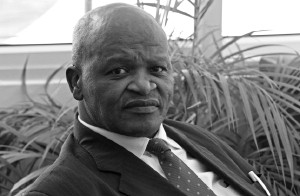
Strong Personality: Judge Herbert Msimang
"Few would have blamed him if he'd
decided this was one trial he absolutely did not want to hear *1"
To say his position was unenviable is putting it mildly. The court was
packed with Zuma supporters, who also clogged the streets outside. Many of
them had let it be known in no uncertain terms that they were prepared to
die, and kill, for Zuma to be president.
The air was electric with tension when Msimang, great-nephew of one of the
ANC's founding fathers, took his seat. Few would have blamed him if he'd
decided this was one trial he absolutely did not want to hear.
In the event, the prosecution provided him with
a perfect way out when, for the umpteenth time, it revealed that it wasn't
ready to proceed and requested a postponement *2.
Msimang grabbed his chance *3.
The state's case had "limped from one disaster to another", he said
witheringly. The prosecutors had ignored the correct guidelines at their own
peril, and "this is now the chickens coming home to roost".
He struck the case from the roll, and suddenly a
Zuma presidency which had looked increasingly unlikely became a real
possibility and, in time, a reality.
According to one school of thought subscribed to by a number of
eminent judges, it was a perfectly sound judgment which had no material
effect on Zuma's ultimate fortunes.
According to another, it was a cop-out which
played into the hands of the defence, which itself had gone to great
lengths to delay the trial at every turn.
In 2010, Msimang was appointed judge president of KwaZulu-Natal, an
appointment that met with wide approval and little, if any, suggestion that
it was based on anything but merit and the generally accepted demands of
transformation.
He improved the administration of the high court and the working of the
registrar's office, and introduced measures to speed up the court process
and reduce the backlog of cases.
He started pre-trial conferences in criminal matters, which was unheard of
at the time, in a not entirely successful bid to ensure that trial delays
were kept to a minimum and cases started when they were supposed to start.
He was not above using the occasional trick to make it seem that the system
was running more efficiently than it actually was. Once, when there were not
enough judges on the roll, he allocated four trials to himself on one day
and found flimsy reasons to strike them from the roll in quick succession.
Msimang had a strong personality, was legally astute, competent, hard
working, well prepared and decisive. He was also dogged by ill health. He
suffered from diabetes, had heart problems and was in constant pain from
gout.
He was always temperamental, but his poor health, in particular the
diabetes, undoubtedly exacerbated his mood swings. He could be irascible,
overbearing and rude. People found him difficult. Junior counsel, in
particular, disliked appearing before him. He tended to bully and
intimidate. He gave one litigant such a grilling that the man, speaking in a
second language, became completely inarticulate and the trial had to be
adjourned.
On another occasion, he was shouting so loudly at an advocate in open court
that the then judge president, Vuka Tshabalala, hearing the rumpus, sent him
a message to adjourn the court. He then apologised for Msimang's conduct.
Msimang was born in Edendale on November 28 1951. He matriculated in Nquthu
in 1969 and obtained a law degree at the University of Zululand in 1973. In
1975, he obtained a master's in law at the Tulane University of Louisiana in
New Orleans, in the US, before returning to the University of Zululand,
where he lectured.
He worked as an advocate of the High Court of Lesotho for two years and
moved to Pretoria in 1979 to do his articles.
In 1985, he joined the practice of Pietermaritzburg attorney Peter Rutsch,
where he worked for 10 years. In 1998, he was appointed an acting judge in
the Natal provincial division of the high court, and he became a full-time
judge in 2002.
In 1996, he was an assessor in the court case that saw former defence
minister Magnus Malan and 12 co-accused walk free after they had been
accused of the 1987 KwaMakhutha massacre.
Judge Msimang is survived by his widow, Museni, and four daughters.
With acknowledgements to Sunday Times.
*1
*2
Just reflecting on it after, what's it now, 4 years, brings on waves of
nausea and melancholy.
*3
The sickness within.
But we can sing, golly woggy boodle all the way.
And we can contemplate the wages :
- Joe Modise died?
- Richard Charter died?
- January Masilela died?
And the careers and PhDs of dozens of others died.